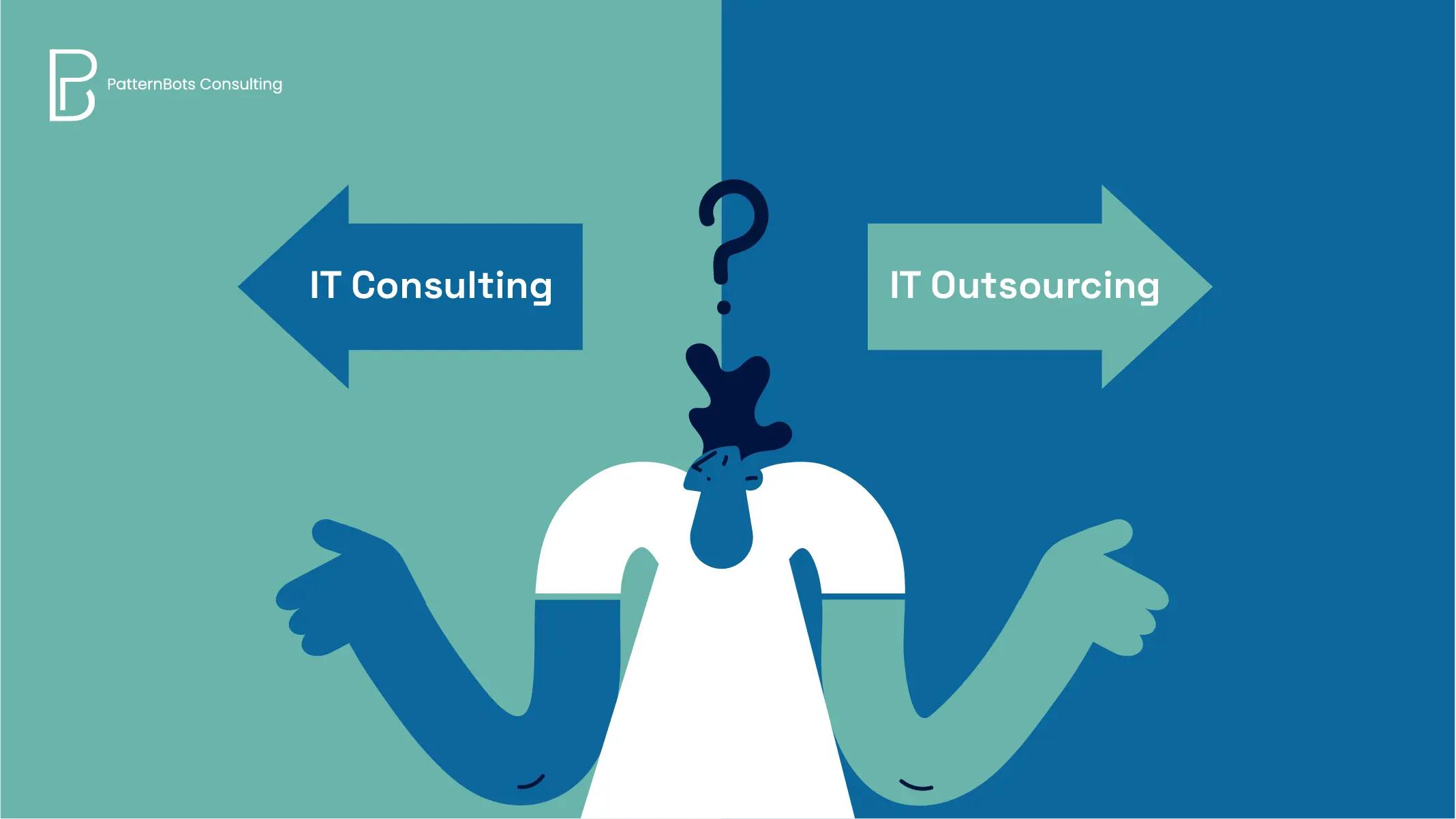
Competition in the business world keeps getting tougher with the evolution of IT technologies. It is crucial for every business today to adopt IT technologies to thrive in the cut-throat market. Most companies that are small or are just starting up may need more money to hire full-time IT professionals; therefore, that’s where the services of IT consulting and IT outsourcing come in handy.
In this blog, we’ll explore the differences between IT consulting and IT outsourcing and help you determine which approach aligns best with your organization’s goals.
What is IT Consulting?

IT consulting is a branch of business consulting that primarily focuses on helping companies with their technology needs. It involves projects that assess how well technology is used in business processes. In simpler words, IT consulting is a service provided by IT companies or individual experts who give their professional advice on technological matters.
What does IT consulting include?
IT consulting involves various services, including advising on integrating IT in business operations or developing IT products. IT consulting aids in cost-saving through efficient technology usage and enhances the efficiency of business processes. It also facilitates the implementation of comprehensive systems such as ERP or CRM.
IT consultants also assess the level of automation in your processes to ensure optimal functionality. Most consulting firms can provide development services, either with their own developers or partner companies.
What is IT Outsourcing?

IT outsourcing is all about giving IT tasks to outside experts who handle them for you. They take care of IT work on your behalf. It’s a smart choice for businesses because it lets them focus on what they do best while experts manage their IT needs.
What does IT Outsourcing include?
IT outsourcing includes experts in the following skills:
- Developers – Front-end, back-end, and full-stack,
- DevOps engineers,
- UI/UX developer/ designers,
- Project managers,
- Business analysts,
- Digital Marketers.
There are many more IT skills involved. However, we have covered the common services that businesses choose to outsource. It is important to understand that some companies may not have any of the above-listed specialists. It all depends on the business direction of the outsourcing company. Also, the difference may lie in the programming languages in which the company’s developers specialize.
Types of IT Outsourcing:

There are three types of IT outsourcing: offshoring, onshoring, and nearshoring.
1. Offshoring IT Outsourcing:
In this type of IT outsourcing, the IT project is given to businesses that are offshore or overseas. Many companies opt for offshore outsourcing as it works out to be considerably cheaper than the rates in their own regions, taxes will be minimal or nil, and the technical workforce will be larger.
2. Nearshoring IT Outsourcing:
In nearshoring outsourcing, businesses entrust their IT projects to a service provider who belongs to the neighboring country. The benefit of this model is that the IT service provider is in the same time zone as the client, and the time difference is one or two hours.
3. Onshoring IT Outsourcing:
Onshoring outsourcing involves the IT service providers residing in the same country. This is also called homeshoring, as the client and service providers share the same nation.
Difference between IT Consulting and IT Outsourcing

Like all services, IT consulting and IT outsourcing come with their own set of unique pros and cons. Let’s explore their differences in depth:
IT Consulting vs. IT Outsourcing – Scope of Services
IT Consulting: Primarily focuses on delivering advisory and strategic services. It’s more about shaping the direction of IT within an organization. The IT Consultants collaborate closely with businesses to create IT strategies that align with their objectives. This includes planning, decision-making, and technology alignment.
IT Outsourcing: Involves entrusting specific IT functions to external service providers. These providers are assigned operational responsibilities like handling daily IT tasks, project management, or specialized services like cybersecurity or application development.
IT Consulting vs. IT Outsourcing – Ownership of Operations
IT Consulting: The company retains control and ownership of its IT operations. The consultants only offer their recommendations, guidance, and expertise. The responsibility for implementation rests entirely with the client.
IT Outsourcing: IT outsourcing service providers carry operational responsibilities. That being said, it means the outsourced IT functions are managed and executed by the service provider to reduce the client’s hands-on involvement.
IT Consulting vs. IT Outsourcing – Duration and Engagement
IT Consulting: In this case, the consultant’s engagements are typically temporary and project-based. They are arranged to address specific IT challenges or opportunities. They work on a contract basis and are often employed for the duration of the project.
IT Outsourcing: In this scenario, the arrangements vary widely in terms of duration depending upon the contracts. They can be long-term contracts, ongoing partnerships, or even short-term engagements. Hence, this flexibility allows organizations to choose the level of support that suits their business needs.
IT Consulting vs. IT Outsourcing – Expertise vs. Execution
IT Consulting: IT consultants bring their expertise, guidance, and recommendations to the table. They help clients understand the best strategies and technologies to achieve their goals. However, the actual execution and implementation of these strategies remain the client’s responsibility.
IT Outsourcing: IT outsourcing providers are responsible for the execution and management of the agreed-upon IT functions. They have the expertise and resources to handle the daily operations so that the client is enabled to focus on their core business activities.
IT Consulting vs. IT Outsourcing – Customization
IT Consulting: IT consulting is customizable and can be arranged to meet the specific needs and goals of the client’s organization. These consultants work closely with clients to develop solutions that address their distinctive challenges and objectives.
IT Outsourcing: IT outsourcing services can only be customized to a certain extent. They often follow standardized processes and solutions. This is because these service providers offer their services to multiple clients, and some level of standardization is necessary for efficiency.
What should I choose between IT Consulting and IT Outsourcing?
The choice between IT consulting and IT outsourcing depends on the needs, goals, and resources you need for your business:
Choose IT Consulting If you need strategic guidance, want to streamline technology with business objectives, or require assistance with specific projects or decisions. IT consulting is ideal when you desire to maintain control of your IT operations and need expert advice.
Choose IT Outsourcing If you need to unload specific IT functions to experts to reduce operational costs and focus on your core business. IT outsourcing is appropriate when you require ongoing support and want to leverage external expertise and resources.
In some cases, businesses can combine both IT consulting and outsourcing services depending upon the needs and priorities of their company.
Read More – Things To Consider Before Hiring Offshore Developers?
Conclusion
IT Consulting and IT outsourcing play pivotal roles in business operations. For businesses that are unable to hire full-time IT professionals, these two options have proven to work wonders in terms of finances and scalability. The benefits and differences between IT consulting and IT outsourcing should be weighed thoroughly before deciding on which services would work best for your business. Some service providers also provide combined services of IT consulting and outsourcing depending upon the priorities and needs of the company.
As you consider your IT strategy, remember the importance of considering factors such as your organization’s size, budget, goals, and the complexity of your IT needs. Each approach offers its unique set of advantages, so choose wisely to propel your business toward greater efficiency and success in the digital age.